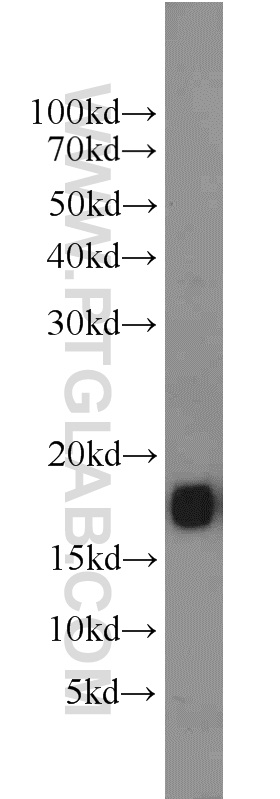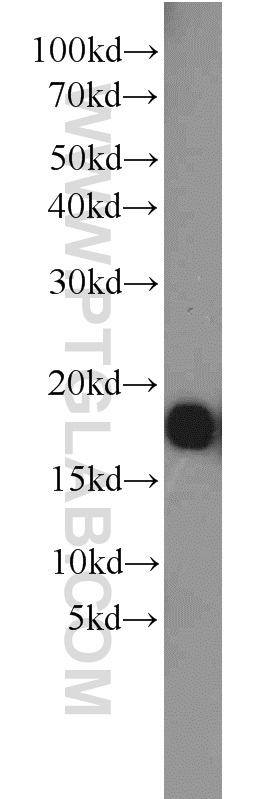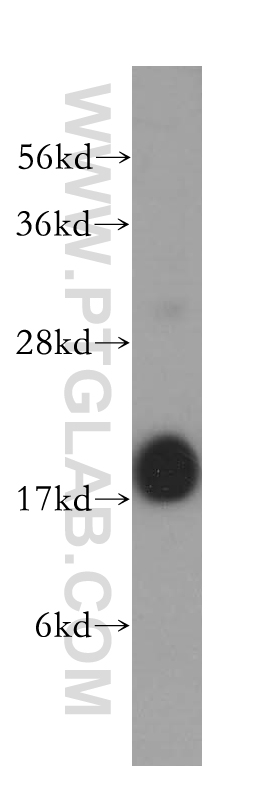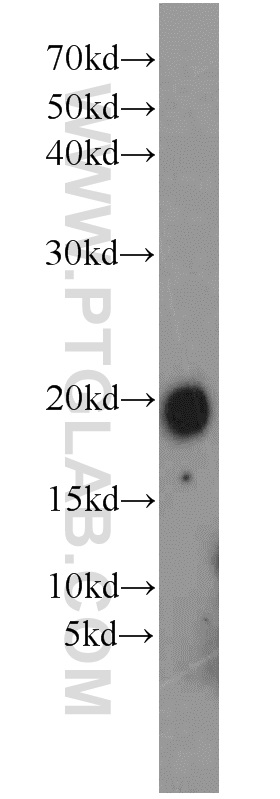验证数据展示
经过测试的应用
| Positive WB detected in | mouse brain tissue, human brain tissue, rat brain tissue |
推荐稀释比
| 应用 | 推荐稀释比 |
|---|---|
| Western Blot (WB) | WB : 1:500-1:1000 |
| It is recommended that this reagent should be titrated in each testing system to obtain optimal results. | |
| Sample-dependent, Check data in validation data gallery. | |
产品信息
11465-1-AP targets FXYD7 in WB, ELISA applications and shows reactivity with human, mouse, rat, pig samples.
| 经测试应用 | WB, ELISA Application Description |
| 经测试反应性 | human, mouse, rat, pig |
| 免疫原 |
CatNo: Ag2030 Product name: Recombinant human FXYD7 protein Source: e coli.-derived, PGEX-4T Tag: GST Domain: 1-80 aa of BC018619 Sequence: MATPTQTPTKAPEEPDPFYYDYNTVQTVGMTLATILFLLGILIVISKKVKCRKADSRSESPTCKSCKSELPSSAPGGGGV 种属同源性预测 |
| 宿主/亚型 | Rabbit / IgG |
| 抗体类别 | Polyclonal |
| 产品类型 | Antibody |
| 全称 | FXYD domain containing ion transport regulator 7 |
| 别名 | FXYD7 |
| 计算分子量 | 9 kDa |
| 观测分子量 | 18-20 kDa |
| GenBank蛋白编号 | BC018619 |
| 基因名称 | FXYD7 |
| Gene ID (NCBI) | 53822 |
| RRID | AB_2108627 |
| 偶联类型 | Unconjugated |
| 形式 | Liquid |
| 纯化方式 | Antigen affinity purification |
| UNIPROT ID | P58549 |
| 储存缓冲液 | PBS with 0.02% sodium azide and 50% glycerol, pH 7.3. |
| 储存条件 | Store at -20°C. Stable for one year after shipment. Aliquoting is unnecessary for -20oC storage. |
背景介绍
FXYD7 (FXYD domain containing ion transport regulator 7) is a single-pass membrane protein that belongs to the FXYD family. The FXYD family, which contains seven members, are tissue specific regulators of the Na,K-ATPase. Expressed exclusively in the brain, FXYD7 is an isoform-specific Na,K-ATPase regulator which could play an important role in neuronal excitability. It has been reported that FXYD7 bears post-translationally added modifications on threonine residues and has an apparent molecular weight of 18 kDa (PMID: 12093728).
实验方案
| Product Specific Protocols | |
|---|---|
| WB protocol for FXYD7 antibody 11465-1-AP | Download protocol |
| Standard Protocols | |
|---|---|
| Click here to view our Standard Protocols |





